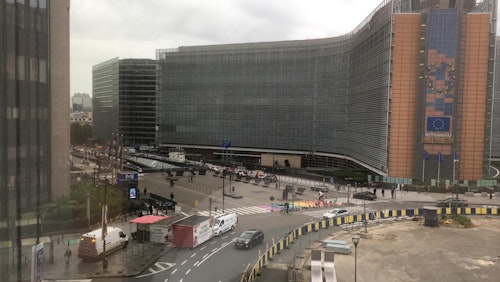Apart from painful losses for the liberal Renew group and the Greens, the overall division of seats in the European Parliament remains largely unchanged despite major upsets in France and other national polls.
After a tumultuous last day of voting and a long night of vote counting and spin, we can now glimpse the new EU political landscape. As predicted by pollsters, populist right-wing parties have seen their share of seats in Brussels surge in several countries. Italian premier Giorgia Meloni’s role as a future power broker in the appointment of the next head of the European Commission, while the victory of Marine Le Pen’s far-right National Rally in France has forced president Macron to call a snap election.
It is not only a story of an ascendant hard-right, though, as the nationalist ID group’s share of seats looks set to remain roughly unchanged overall in Brussels. While the eurosceptic ECR may gain half a dozen or so seats, the centre-right European People’s Party (EPP) has consolidated its position as the largest faction in the European Parliament, looking to have added a similar number to its current 178.
The Socialists & Democrats comfortably remain second largest, more or less holding onto their 140 seats. The liberals, in the form of the Renew Europe group, have taken a drubbing, however, while 2019’s ‘Green Wave’ – which in large part led to the prominence of climate and environmental policy in the agenda of the von der Leyen Commission – has clearly subsided.
Of course, the votes are still being counted, but so far the major upsets have been at the national level rather than in the balance of power in Brussels. But the horse trading between political groups has yet to get under way in earnest. Stick with Euronews throughout the day as we follow the big election stories, and shine a light on potentially significant developments on the sidelines.

 ${title}
${title}
Live ended
 Our live blog has come to an end
Our live blog has come to an end
After five intense days following all the twists and turns of this electoral cycle, Euronews is closing its live blog. We thank you for your attention and consideration.
Here are the highlights of Monday, the day after the elections:
- Ursula von der Leyen offered, again, to work with the Socialists and Liberals on a coalition agreement for the next five years. But she remained noncommittal on whether the invitation would be extended to the Greens.
- The EPP Secretary General Thanasis Bakolas told Euronews the party would not seek a "formalised" arrangement with Giorgia Meloni and the hard-right ECR group. However, he said the EPP could work with the ECR on a case-by-case basis to negotiate "major legislation."
- German Chancellor Olaf Scholz and Spanish Prime Minister Pedro Sánchez have been nominated by the Party of European Socialists (PES) to lead the upcoming negotiations for the EU top jobs.
- The liberal group of Renew Europe, which fell from 102 to 79 MEPs, says it is willing to talk with the EPP and the Socialists to build a centrist coalition. Valérie Hayer says there will be no cooperation with the ECR and the cordon sanitaire will remain.
- Alexander De Croo, the prime minister of Belgium, handled his resignation to King Philippe, following his liberal party's disappointing result in the three elections held in the country.
- Marine Le Pen, from France's National Rally, and Matteo Salvini, from Italy's Lega, will meet in Brussels on Wednesday morning to discuss the future of the far-right Identity and Democracy (ID) group, in which their MEPs currently sit.
- Maximilian Krah, the scandal-hit lead candidate of the far-right Alternative for Germany (AfD), will not sit with his party fellows once they assume office. His removal could pave the way for AfD to be re-admitted into the ID group.

Croatian PM shares pictures of EPP virtual summit
Have you ever wondered what a Webex meeting of conservative leaders looks like? Croatian Prime Minister Andrej Plenković is here to show us.
In a social media post, Plenković shared a couple of pictures of the virtual meeting of the European People's Party (EPP) held on Monday after the elections. The images show EPP President Manfred Weber (with the must-have corporate background) and thumbnails of Greece's Kyriakos Mitsotakis, Poland's Donald Tusk, Ireland's Simon Harris and Sweden's Ulf Kristersson, who appears to be noticeably close to the camera. Also spotted is Ursula von der Leyen, who is seeking a second term at the top of the European Commission.
"Our political family remained the strongest group in the European Parliament," said Plenković. "Based on the will of the voters, we want the EPP to continue to lead Europe and address the challenges ahead!"
After the 🇪🇺 elections, we held the @EPP summit. Our political family remained the strongest group in @Europarl_EN, and @HDZ_HR contributed by winning 6️⃣ out of 12 seats. Based on the will of the voters, we want the EPP to continue to lead Europe and address the challenges ahead! pic.twitter.com/ROvJVSolSe
— Andrej Plenković (@AndrejPlenkovic) June 10, 2024
Péter Magyar wants to joint the EPP but he's accused of domestic violence. Could this derail his ambitions?
Péter Magyar, a former government insider who has become the rising star of Hungary's opposition, wants his Respect and Freedom Party (TISZA) to join the centre-right European People's Party (EPP). In the elections, Magyar secured seven MEPs, which would further enlarge the EPP's lead over the socialists.
But Magyar has been accused of domestic violence by his former wife, Judit Varga, who also says Magyar recorded private conversations to use them for "political purposes."
Could the allegations derail his European ambitions? Our reporter Shona Murray put the question to the EPP Secretary General Thanasis Bakolas. Watch the moment in the clip below.
The EPP's Secretary responded to allegations of domestic abuse levelled against Péter Magyar by his former wife.
— euronews (@euronews) June 10, 2024
Magyar is Orbán's main opposition rival. Once an ally, he now leads the Tisza Party, which stands against Orbán's Fidesz.#EUElections2024 pic.twitter.com/k3VAPAbD5x
Viktor Orbán says the election results move Europe 'to the right and towards peace'
Hungary's Prime Minister Viktor Orbán has just reacted to the results of the EU elections, where his hard-right party Fidesz received around 45% of support and 11 MEPs. The emerging opposition party of Peter Magyar, a former Fidesz member who has made exposing corruption his mission, came second with 29.60% of all votes and 7 MEPs.
"The Hungarian democracy is strong and vibrant. We recorded the highest voter turnout ever in a European election in Hungary, 59.3%," Orbán wrote on social media. "Europe’s political landscape has shifted to the right and towards peace."
The premier promised to "build" on these results to "achieve our goals" as the country takes the reins of the EU Council's rotating presidency, set to begin on 1 July. The prospect of Hungary setting the political agenda and moderating crucial discussions in Brussels has unnerved diplomats, who fear the bloc's policy on Ukraine will be effectively paralysed. Since the start of Russia's invasion, Orbán has opposed sanctions against Russia and military assistance to Kyiv, blocking over €6.5 billion in aid.
The message of yesterday’s Hungarian and #EuropeanElections is clear:
— Orbán Viktor (@PM_ViktorOrban) June 10, 2024
1. The Hungarian democracy is strong and vibrant. We recorded the highest voter turnout ever in a European election in Hungary, 59.3%.
2. Hungarians came out in record numbers to vote for #peace. Never before…
Latvian Prime Minister will nominate Dombrovskis for a third term as European Commissioner
Latvia's Prime Minister Evika Siliņa has announced that, following her party's strong showing in the elections, she will nominate the lead candidate on the list, Valdis Dombrovskis, as the country's next European Commissioner. The centre-right New Unity (Jaunā Vienotība) came on top with 25.07% of all votes and two MEPs.
Dombrovskis is, of course, a well-known face in Brussels after having served two consecutive terms as European Commissioner. He is currently the executive vice-president for the economy and trade relations, a powerful position for a country the size of Latvia. His inclusion in the electoral list was a tactical move to capitalise on his profile and attract voters. Dombrovskis never intended to take his seat in the European Parliament; his goal was always the Commission.
"Valdis Dombrovskis has received overwhelming support from the highest voters. His experience and knowledge are also valued in the EU institutions. It is in Latvia's interest to strengthen its influence in Europe," Siliņa said on social media.
Valdis Dombrovskis saņēmis pārliecinoši augstāko vēlētāju atbalstu. Viņa pieredzi un zināšanas novērtē arī ES institūcijās. Latvijas interesēs ir nostiprināt ietekmi Eiropā. Tāpēc virzu @VDombrovskis uz eirokomisāra amatu, lai kandidatūru varētu apstiprināt arī valdībā.
— Evika Siliņa 🇱🇻🇺🇦 (@EvikaSilina) June 10, 2024
EPP won't seek formal deal with Giorgia Meloni, says secretary general
The centre-right European People's Party will not seek to strike a formal deal with Giorgia Meloni and her hard-right European Conservatives and Reformists (ECR) group, neither to re-elect Ursula von der Leyen nor to underpin a governing majority in the next mandate, the EPP's secretary general said a day after the elections.
The polls saw the EPP conquer with 186 seats, far ahead of the 135 obtained by the Socialists and Democrats (S&D) group and the 79 of the liberal Renew Europe.
"The EPP will seek to form a majority in the European Parliament with friends and allies that we have worked before with the Socialists, with the Liberals, hopefully also maybe with the Greens. And the numbers are there for such a majority, and that's good," Thanasis Bakolas told our colleague Shona Murray on Monday afternoon.
But, Bakolas added, when it comes to "major legislation, we will look to MEPs that are willing to listen and to vote for us." This cooperation will depend on whether lawmakers further to the right are pro-European, pro-rule of law and pro-Ukraine, he said, echoing the main criteria that von der Leyen established during her campaign.
"Giorgia Meloni's MEPs may want to vote for us. And I think that would be great. But I don't see any institutional or more formalised (deal) beyond that," he added.
Read the full interview on Euronews.
EPP won’t seek formal deal with Meloni, says secretary general
The Green Deal has been “too ideologically driven” and needs to be rethought to emphasise the “competition angle,” says Thanasis Bakolas. #EuropeNews
Where did the Greens and Liberals go wrong?
Political fragmentation, the rise of the far-right, national responses to housing, inflation, the war in Ukraine and the efforts required by the European Green Deal may play a role in the painful losses suffered by the liberal Renew group and the Greens, Marta Pacheco reports.
What went wrong for the EU election-losing Greens and Liberals?
Political fragmentation, far-right, national responses to housing, inflation, the war in Ukraine and the efforts required by the European Green Deal may play a…
One group that failed to resonate with voters in the European Parliament elections, as Euronews Cynthia Kroet reported, is the left-wing European United Left/Nordic Green Left (GUE/NGL). It saw its seats diminish to 36, from 41 in 2019, according to the latest projections. It did, however, get unexpected support in Finland and Denmark, where the extreme left – as well as the Socialists and Democrats and Greens – made some big wins.
Extreme left lost, but gained unexpectedly in the north
Socialists manage to secure seats as voters reject current governments. #EuropeNews
Liberals vow to build pro-European majority and maintain cordon sanitaire with extreme right
Today we heard from Valérie Hayer, the president of Renew Europe, the liberal group in the European Parliament. Hayer was notably absent on Sunday night as the lead candidates took the stage to reflect on the election results.
On Monday, Hayer travelled from Paris to Brussels and addressed journalists. "Renew will assume its responsibility. We are the central centrist force in these elections, and no coalition will be done without us," she said. "We will hold discussions with the pro-European and democratic forces in this European Parliament to build a pro-European majority that defends the interests of our citizens."
Hayer stressed the need to maintain the cordon sanitaire with the extreme right and rejected any possible agreement with the hard-right European Conservatives and Reformists (ECR) group of Giorgia Meloni. "The Renew group will remain the central group in this European Parliament, both in arithmetical terms of what we weigh today, but also in terms of political positioning," she said.
But Hayer also appeared humbled by the results, which show Renew has fallen from 102 to 79 MEPs, mainly after being routed in France. "The Renew group, unfortunately, has suffered losses," she said. "But we also have positive dynamics and breakthroughs in certain countries."
Regarding the possible expulsion of VVD, the Dutch liberal party that recently struck a coalition agreement with the far-right of Geert Wilders, Hayer said an "informal discussion" with the heads of national delegations will happen this week and a final decision will be taken "in the next few weeks." (A vote was initially announced for 10 June.)
"My responsibility as Group President is to enable a discussion to take place on this issue and to take a decision in a coherent and responsible manner with the entire group," she said.
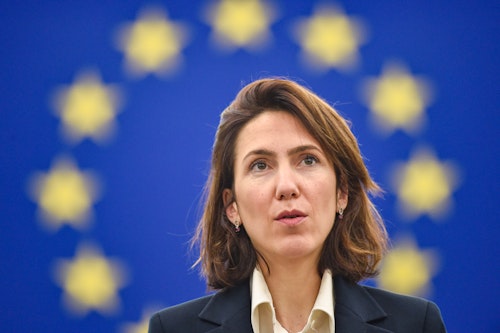
Scholz and Sánchez to lead negotiations for EU top jobs on behalf of Socialists
German Chancellor Olaf Scholz and Spanish Prime Minister Pedro Sánchez have been nominated by the Party of European Socialists (PES) to lead the upcoming negotiations for the EU top jobs.
The jobs up for grabs are the president of the European Commission, the president of the European Council, the president of the European Parliament and the High Representative for Foreign Affairs. These appointments involve tricky political manoeuvring since their distribution must account for party affiliation, geographic representation and gender balance.
Runners and riders, as things stand:
- The Commission goes to the European People's Party (EPP), the winner of the elections. Ursula von der Leyen is the undisputed frontrunner.
- The Council goes to the Socialists, who have never held the position. Potential candidates include Portugal's former prime minister António Costa and Denmark's prime minister Mette Frederiksen. (Read more from our colleague Gerardo Fortuna.)
- The High Representative goes to the Liberals, who have likewise never held the high-profile portfolio. Names including Estonia's Kaja Kallas and Belgium's freshly resigned Prime Minister Alexander De Croo have been floated.
- The presidency of the Parliament will be decided by MEPs themselves and could go to either the EPP or the Socialists. Given the size of the EPP's victory, chances are the conservatives will get it.
In a statement, the PES says the party has a "solid power of negotiation" after finishing second in the elections and is willing to "speak and negotiate with all political forces except for the extreme right," meaning the ECR and the ID groups.
Copyright 2023 The Associated Press.
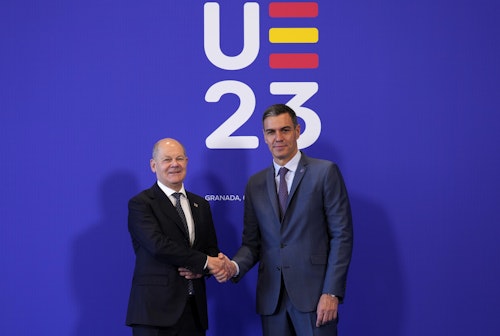
Volt Europa obtains 5 MEPs, its best result ever
Volt Europa, the progressive movement that advocates European federalism, has earned its best electoral result since its foundation in 2017. The small party obtained five MEPs: two from the Netherlands and three from Germany. In total, it received 1.4 million votes.
This is a big jump for Volt Europa, which currently has only one lawmaker: Damian Boeselager. The newly elected members will have to choose one political group to sit with for the next five years. Boeselager is today affiliated with the Greens.
"Over 1.4 million people trusted Volt with their vote around Europe, and our new MEPs represent every single one of them!" Volt Europa said on social media. "This is a win for progressive politics in Europe. Our MEPs will fight for all Europeans and oppose the dangerous rise of populism."
2 seats for @VoltNederland + 3 seats for @VoltDeutschland = 5 seats for Europe! 🥳 (1/3)#VoteVolt pic.twitter.com/SAkg5uUHfB
— Volt Europa (@VoltEuropa) June 10, 2024
Analysis: The reasons behind Olaf Scholz's stinging defeat
It's no secret that Olaf Scholz's three-party coalition is unpopular in Germany. Since its inception in December 2021, the alliance between Socialists, Greens and Liberals has been plagued with internal disagreements, some of which have played out in public. The gradual erosion of support came to the fore as the results of the EU elections were announced: Scholz's SPD dropped from 16 to 14 MEPs, while the Greens fell from 21 to 12 seats, without counting allies like Volt. However, the liberals of the FDP retained their five lawmakers.
Our reporters Tamsin Paternoster and Olivia Stroud have teamed up in this post-electoral analysis to explain what went wrong with the Chancellor's "traffic-light" coalition.
Why did Olaf Scholz’s coalition do so badly?
German Chancellor Olaf Scholz’s Social Democrats suffered their worst result in a national vote in more than a century, renewing questions over the government’…
Le Pen and Salvini will meet on Wednesday and possibly discuss AfD's readmission
Marine Le Pen, from France's National Rally, and Matteo Salvini, from Italy's Lega, will meet in Brussels on Wednesday morning to discuss the future of the far-right Identity and Democracy (ID) group, in which their MEPs currently sit. Other ID figureheads will be present.
The meeting, ANSA reports, will touch upon the possible re-admission of the Alternative for Germany (AfD), which was expelled last month over the controversial remarks of its lead candidate, Maximilian Krah. In an interview with an Italian newspaper, Krah said he would not automatically classify as "criminal" those who wore SS Nazi uniforms. The remarks quickly went viral and prompted the National Rally to repudiate the AfD, a long-time ally. Lega then said it would support the National Rally's official line.
On Sunday, ID-affiliated parties secured 58 MEPs, mostly driven by the strong showing of the National Rally, which swept the vote with 30 MEPs. By contrast, Lega collapsed, falling from 22 to 8 lawmakers.
This means that, as of July, the ID group will be overwhelmingly dominated by French voices, making it difficult for Italians and other delegations to advance their views. The potential re-admission of AfD, with its 15 MEPs, could help rebalance the geographical representation. AfD members voted on Monday to remove Krah from the list, meaning he will not take his seat in July.
However, bringing back AfD, one of Europe's most radical far-right parties, could backfire and derail Le Pen's attempts to "normalise" the National Rally and expand its electoral base, a pressing task after President Emmanuel Macron called for snap elections.
Credit: Associated Press.
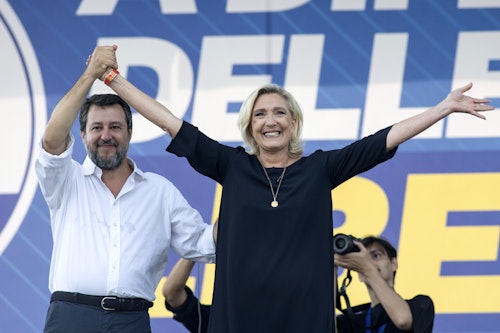
Spain’s Yolanda Díaz steps down from Sumar leadership after election debacle
Spain's Labour minister and second deputy prime minister, Yolanda Díaz, has resigned from the leadership of the left-wing Sumar party after a disappointing result in the European elections.
"The last elections were a mirror. Citizens do not make mistakes when they vote or when they decide not to vote," she said on Monday in a video statement.
Sumar won only 4.65% of the vote (three seats), just around 10,000 votes more than the new far-right party Se acabó la fiesta (The Party is Over).
"In this case, it is my responsibility," Díaz continued.
Nevertheless, the left-wing politician will not resign from her posts as labour minister and second deputy prime minister.
“It is necessary to step aside to take a step forward in the politics that matter to the people, the politics that serve the hard-working people of this country who make enormous efforts every day and deserve us to be on their level”, she concluded.
🔴 Yolanda Díaz asume en primera persona los malos resultados de Sumar en las europeas: "La ciudadanía no se equivoca cuando vota (...) Es mi responsabilidad. Voy a hacerme cargo"https://t.co/Ye6sj0iFMv #9J #eleccioneseuropeas pic.twitter.com/flasZREthi
— Cadena SER (@La_SER) June 10, 2024
Why didn't Ursula von der Leyen invite the Greens for talks?
As the victory of the European People's Party (EPP) became incontrovertible on Sunday evening, Ursula von der Leyen took the stage to declare the centre had held and defied predictions of a far-right surge.
Von der Leyen, the EPP's lead candidate, then extended an invitation to the Socialists and the Liberals to work together on a joint programme that would sustain her second mandate at the top of the European Commission. Together, the three parties would command a 400-strong majority, at least.
Notably, von der Leyen's invitation did not include the Greens, which are predicted to fall from 71 to 52 seats. "First things first. Let me do this first step and then let's discuss the second step," she said.
Von der Leyen repeated her noncommittal answer on Monday afternoon as she spoke at the CDU headquarters in Berlin. "To save time," she explained, the talks will begin with Socialists and Liberals but the door remains "open" for others. Speaking by her side, CDU leader Friedrich Merz said the Greens would be irrelevant in the next European Parliament.
The omission was eye-catching given that the Greens have been the staunchest advocate of von der Leyen's flagship proposal, the Green Deal, which she once described as Europe's "man on the moon" moment. But the ambitious legislation in the Green Deal, such as a gradual ban on the combustion engine, has enraged her fellow conservatives and become a target of explicit attacks. In the last year, conservatives, backed by some liberals, derailed von der Leyen's plan to slash the use of pesticides and effectively blocked the Nature Restoration Law. The farmer protests that began earlier this year further deepened the right-wing dislike for the Green Deal, putting its architect, Ursula von der Leyen, in a visibly awkward position.
This helps explain her reticence to invite the Greens for the upcoming round of negotiations, as doing so risks sending a signal that right-wing MEPs could weaponise against her. However, given that von der Leyen lacks unanimous support among the EPP, Socialist and Liberal ranks, she might end up being forced to reach out to the Greens to secure the 361 votes needed for her re-election.
Copyright 2024 The Associated Press.
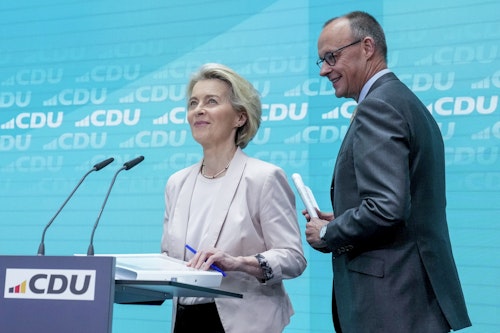
Despite Meloni's big win, Italy is good news for the Socialists
With results now out, it is safe to say that Italy's Partido Democratico (PD) has exceeded expectations, capturing 24.06% of votes and 20 MEPs, up from the 15 it currently has. Opinion polls leading up to the elections had suggested the PD would earn 20% maximum. "If the projections are confirmed, it will be an extraordinary result for us," the PD said on Sunday.
The centre-left party, led by Elly Schlein, is the main opposition to Giorgia Meloni's Brothers of Italy (FdI), which came on top with 28.77% of votes and 24 seats.
The outcome will be warmly welcomed by the Party of European Socialists (PES), which has repeatedly attacked Meloni's three-party coalition as an example of the normalisation of the extreme right. The PES held its congress in Rome to warn about the bloc's ongoing shift to the right and the potential erosion of fundamental rights.
The 20-seat tally for PD means the Italians will equal the Spaniards as the largest national delegation in the socialist group of the European Parliament. This suggests the leadership of Iratxe García Pérez, a close ally to Spanish Prime Minister Pedro Sánchez, might soon come to an end to pave the way for an Italian lawmaker who can take the reins.
Copyright: LaPresse via Associated Press.
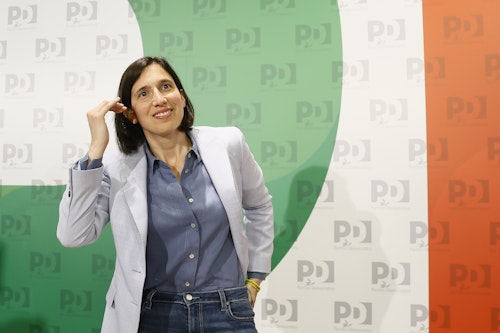
Imprisoned ethnic Greek mayor-elect secures EPP seat
Fredi Beleri - an ethnic Greek politician elected mayor of the southern Albanian town of Himare but imprisoned - has bagged a seat in the European Parliament after running on the list of the ruling New Democracy party of Greek Prime Minister Kyriakos Mitsotakis.
Beleri was handed a prison sentence in Albania in March 2024 on charges of vote-buying, after a trial that strained Greek-Albanian relations.
Athens has since threatened to block Albania's EU accession process in retaliation, claiming that the charges against Beleri are politically motivated
Greek media reports that Beleri's election campaign was run by his son, Petros Beleri.
Belgian Prime Minister Alexander De Croo handles his resignation after his party's bad performance
Alexander De Croo, the prime minister of Belgium, has handled his resignation to King Philippe, following his liberal party's disappointing result in the three elections held in the country on Sunday.
His Open VLD party, which runs in Flanders, secured only 5.51% of votes in the EU elections, falling from two to one MEP. Its French-speaking counterpart, MR, surprised observers with a better-than-expected tally of three seats.
Open VLD also performed badly in the federal elections, with five lost seats, and in the regional elections of Flanders, where it saw seven seats taken away. This represented a stinging defeat for De Croo, who had been closely involved in the campaign.
"The King has accepted my resignation. The government will manage current affairs and prepare the transition to a new team," De Croo said on Monday. "I would like to sincerely thank our voters and militants. The election results are a disappointment and I take responsibility for that."
De Croo's seven-party coalition has been delicate since it was formed in October 2020 and had plenty of disagreements that threatened its survival. The polyglot premier, however, managed to build up his EU credentials and his name is now being discussed as a possible replacement for Josep Borrell, the EU's foreign policy chief.
De Koning heeft mijn ontslag aanvaard.
— Alexander De Croo 🇧🇪🇪🇺 (@alexanderdecroo) June 10, 2024
De regering gaat de lopende zaken beheren en de overgang naar een nieuwe ploeg voorbereiden.
Ik wil onze kiezers en militanten van harte bedanken.
De verkiezingsuitslag is een teleurstelling en neem daar mijn verantwoordelijkheid voor. pic.twitter.com/IMm4Ffuxfz
Analysis: Orbán wins the elections in Hungary but his tight grip on power weakens
Let's go now to Hungary, where Fidesz, the ruling party of Viktor Orbán, has come on top with 44.61% of votes and 11 MEPs, slightly down from the 12 it currently has. This tally, though, represents the party's worst performance since the Central European country joined the bloc. Back then, Fidesz captured 47% of the vote and 12 MEPs.
The news shows Orbán's decades-long grip on power has weakened, although it remains considerably strong by EU standards.
The pattern began earlier this year when it emerged that President Katalin Novák, a close ally of Orbán, had granted a pardon to a person convicted of covering up a child sexual abuse case. The revelations prompted massive protests on the streets and forced Novák to resign. Weeks later, a new scandal hit Orbán after Péter Magyar, a Fidesz insider, released damaging audio recordings that exposed corruption and cover-ups inside the government. Magyar then seized the moment and fashioned himself as the main opposition figure, despite the allegations of domestic abuse leveled against him by his former wife, Judit Varga.
Magyar's bet, initially seen as a long shot, has now paid off: his centre-right Respect and Freedom Party (TISZA) secured seven MEPs in the elections and an invitation to join the European People's Party (EPP), where Fidesz used to sit until its radical policies prompted its expulsion.
Having been non-attached for the past few years, Orbán intends to bring his party into the hard-right European Conservatives and Reformists (ECR) group dominated by Italy's Giorgia Meloni. But Orbán's public display of affection for Russia's Vladimir Putin has caused unease among some ECR members, who are strong supporters of Ukraine.
Copyright 2024 The Associated Press.
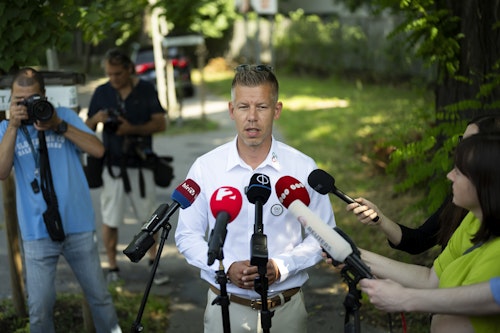
EU Environment Commissioner to resign
Virginijus Sinkevičius, EU Commissioner for Environment Oceans, and Fisheries, is set to stand down after being elected as an MEP in his native Lithuania. Although he could transfer his seat and remain in his current post, he has told the Lithuanian press that he has no intention of doing so.
As top of the electoral list for the newly formed Lithuanian Union of Democrats (Demokratų Sąjunga “Vardan Lietuvos”), Sinkevičius will occupy the party’s one seat in the European Parliament after it garnered 6% of the vote. The youngest ever EU commissioner (he turns 34 on 4 November) will sit among the truncated ranks of the Greens/EFA group.
A source in the commissioner’s cabinet confirmed Sinkevičius's imminent move, and told Euronews it would now be “up to [European Commission president Ursula] von der Leyen” to decide what to do with his portfolio in the interim until a new EU executive is put in place – something which is unlikely to happen much before his 35th birthday.
At our last #EPlenary we debated the recent discussions on the future of the #EUGreenDeal & overall climate & environment policies.
— Virginijus Sinkevičius (@VSinkevicius) April 24, 2024
My message is clear.
The Green Deal always was & remains our growth strategy to ensure our industry’s competitiveness & our energy independence. pic.twitter.com/iqEZqR36cX
Ilaria Salis, the activist controversially imprisoned in Hungary, elected to the European Parliament
Ilaria Salis, the Italian anti-fascist activist imprisoned in Hungary, has secured a seat at the European Parliament.
She was arrested in Budapest in February 2023, and has since been seen led into court cuffed in chains by the hands and ankles, sparking protests in Italy and international outcry. Hungary has claimed it is standard procedure.
The Italian Greens and Left Alliance added Salis to their list of candidates in April in agreement with her father, Roberto Salis.
On Monday morning, a spokesperson for the Left group in the European Parliament indicated the group's readiness to welcome Salis into their faction: "We have been in touch with Ilaris Salis's team and her family in particular over the last few months."
"I can say that as an anti-fascist activist I think Ilaria Salis would find a very comfortable home in our group and very supportive colleagues ... so we'll be reaching out to them (Salis's family) in the next few days," the spokesperson added.
Tie broken in Portugal as Socialists pull ahead with 8 MEPs
Last night you heard that socialists and conversations had tied in Portugal, each securing 7 MEPs. But the updated results show this is no longer the case. The Socialist Party (PS) has pulled ahead with eight lawmakers, while the conservative Aliança Democrática (AD) of Prime Minister Luis Montenegro is left with seven.
The outcome represents a sigh of relief for the socialists, who last year were thrown into disarray over a corruption scandal that triggered the resignation of long-serving Prime Minister António Costa. "Thank you to all Portuguese for making the PS once again the greatest political force in Portugal. We continue (striving) for more!" said Pedro Nuno Santos, the Socialist Party's secretary general.
As previously reported, the far-right Chega enters the European Parliament for the first time, with two representatives. And rising hopes for Green representation were dashed in the end, as the party failed to reach the necessary threshold.
A primeira eleição nacional ganha por uma mulher. Obrigado, Marta, pela extraordinária campanha. Obrigado a todos os Portugueses por fazerem do PS novamente a maior força política em Portugal. Seguimos por mais! #PartidoSocialista pic.twitter.com/1JoquijS2b
— Pedro Nuno Santos (@PNSpedronuno) June 10, 2024
Macron sets off game of French roulette
French President Emmanuel Macron set off a political earthquake after he announced on Sunday he was dissolving the National Assembly and calling early legislative elections following his party's stinging defeat in the European elections.
Some commentators have described the move as ballsy, others as folly with possible wide-ranging implications for France and Europe.
We break it all down for you.
France snap elections: Why Macron is gambling with France and Europe?
Macron lost his absolute majority in parliament in 2022 and has had to negotiate support from opposition parties on a case-by-case basis. #EuropeNews
The Party's Over: The far-right challenger that's clinched three Spanish seats
One of the major surprises of the night in Spain was newcomer Se Acabó la Fiesta (The Party's Over) bagging three seats as it gains parliamentary representation for the first time at any level.
Its founder, Alvise Pérez, is a controversial political commentator (now turned MEP) who has built his campaign on promises to fight the so-called corrupt political elite and crack down on criminality.
His abrupt emergence onto the political stage suggests that his anti-system messages have lured in right-wing voters.
But Pérez is embroiled in multiple judicial cases and has been found guilty of spreading fake news online and infringing the legal right to privacy by taking and sharing pictures of public figures without their consent. He has openly said that his aim in fighting for a seat in the European Parliament was to seek parliamentary immunity, which means he cannot be exposed to legal proceedings because of opinions expressed or votes cast in his capacity as MEP
Maximilian Krah removed from AfD delegation
Maximilian Krah, the scandal-hit lead candidate of the far-right Alternative for Germany (AfD), will not sit with his party fellows once they assume office following the elections. A vote to remove him from the delegation took place on Monday, according to Tagesschau.
AfD has secured 15 MEPs, up from the 11 they have now. Despite the increase, the tally is not as high as the party was initially forecast to receive. Krah has been at the centre of a string of controversies, including allegations that his assistant had spied on behalf of the Chinese government. Last month, Krah made headlines after he refused to say that everybody who wore a SS Nazi uniform was automatically a "criminal." This prompted AfD's expulsion from the far-right Identity and Democracy (ID) group and Krah's absence from the campaign's last days.
"I wish my newly elected (MEP) colleagues every success in their attempt to rejoin the ID group without me. I think this is the wrong path and sends a devastating signal to our voters, especially our young voters," Krah said on social media, confirming the news of his departure.
Ich wünsche meinen neu gewählten Abgeordnetenkollegen viel Erfolg bei ihrem Versuch, ohne mich wieder in die ID-Gruppe einzutreten. Ich halte diesen Weg für falsch und ein verheerendes Signal an unsere Wähler, besonders an unsere jungen Wähler. #AfD
— Dr. Maximilian Krah MdEP (@KrahMax) June 10, 2024
pic.twitter.com/jGSALTp3wt
What next for the Green Deal? NGOs react...
The run-up to the elections saw an anti-green deal backlash, exemplified by rowdy farmers’ protests in Brussels and across Europe, and the Greens/EFA lost 20 of its 72 seats, the biggest proportional loss of any group in the parliament. This morning, campaign groups have urged centrist MEPs to hold the line.
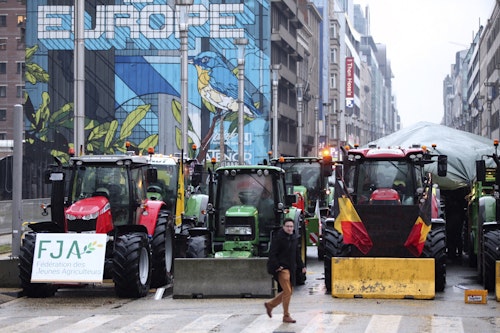
"Protectors of climate and nature are still a strong voice of progress in Europe,” said Patrick ten Brink, secretary general of the European Environmental Bureau, an influential NGO umbrella group. “The triple climate, nature and pollution crises will continue to affect people across all party constituencies and should not be a partisan issue.”
Climate Action Network Europe, another of the 'Green 10' largest environmental groups active in the EU capital took a similar line, noting the new crop of MEPs will be the last who can bring Europe in line with the 2015 Paris Agreement commitment to limit global temperature rise to 1.5 degrees above pre-industrial levels.
“Europe is the fastest warming continent and our leadership is liable for extinguishing the problem domestically, whilst also living up to our global commitments to combat the climate emergency,” CAN Europe director Chiara Martinelli says.
ClientEarth, which has been involved in a slew of legal actions against governments and EU insititutions they accuse of failing to fulfil their environmental commitments. “As environmental lawyers, we will be watching – and poised to defend our future if we need to,” says Anaïs Berthier, who heads the group’s Brussels office.
“The parties that gained significant MEPs in these elections have run a dangerous and misleading campaign against environmental legislation, which has become the scapegoat for all that is wrong at EU level,” Berthier said.
Dutch Socialists get an extra MEP at the expense of Geert Wilders
We have an update from the Netherlands: the Labour-Green Alliance has won an extra seat, going to nine MEPs in total: five for the socialists and four for the greens. Meanwhile, the far-right Party for Freedom (PVV) of Geert Wilders has dropped to six, after previously being projected to get seven seats.
The results represent a victory for progressive parties and a disappointment for Wilders, who last year comfortably won the national elections.
"Together with the excellent performances of other pro-European parties, this shows that a majority in the Netherlands wants to strengthen Europe and certainly not destroy it," said Frans Timmermans, the leader of the Labour Party and a former European Commissioner.
GroenLinks-PvdA is met duidelijk verschil de grootste partij geworden bij deze verkiezing. Samen met de knappe prestaties van andere pro-Europese partijen laat dit zien dat een meerderheid in Nederland Europa wil versterken en zeker niet slopen. pic.twitter.com/7zvXpvamc3
— Frans Timmermans (@F__Timmermans) June 9, 2024
Renew's VVD cliffhanger
We're hearing that there might not be a vote on the VVD's continued membership into Renew Europe today after all, despite Valérie Hayer's previous pledge to hold such a vote the day following the elections.
Instead, it's likely we'll have to wait until the group's constitutive meeting on June 25 to find out if VVD's four MEPs will sit within Renew Europe.
Which parties are set to send the biggest delegations to Brussels?
As things stand, here are the biggest national delegations in the new European Parliament:
- France's National Rally (ID) have won 30 seats
- Germany's CDU/CSU (EPP) are at 29 seats
- Brothers of Italy (ECR) have secured 24 seats
- Spain's Popular Party (EPP) are at 22 seats
- Spain's Socialist Party (S&D), Poland's Civic Coalition (EPP) and Law and Justice (ECR), and Italy's Democratic Party (S&D) are all at 20 seats
Portugal's centre-right prime minister backs socialist Antonio Costa for European Council Presidency
Portuguese premier Luis Montenegro has thrown his weight behind the potential candidacy of his predecessor, Antonio Costa, for the presidency of the European Council.
Speaking shortly after his centre-right coalition - Aliança Democrática (AD) - was narrowly edged by the socialist opposition in the European ballot, Montenegro said: “It’s possible for the presidency of the European Council to be destined to a socialist."
"If Dr. António Costa is a candidate for that position, the AD and the Government of Portugal will not only support but will do everything so that this candidacy can be successful.”
Costa stepped down abruptly as the country's prime minister last November amid a corruption probe involving his chief of staff. Montenegro became prime minister in April after his AD coalition narrowly topped the March snap elections, ousting the socialists.
But Costa could make his political comeback in Brussels, as he is one of the names touted to replace Charles Michel as the next European Council President.
Four scenarios to determine European Council leadership
The appointment of Charles Michel’s successor will be less a matter of names as which of four key configurations arise following this week’s election. #EuropeN…
How did young people vote in Germany?
An analysis by German public TV ZDF suggests support for the right wing is solid among Germany's young people.
An estimated 17% of voters between 16 and 24 years old voted for the radical right-wing Alternative for Germany (AfD), and a further 17% for the conservative CDU/CSU.
The Greens, who have traditionally had a strong youth vote, saw support drop sharply while the pan-European Volt party and the animal welfare party fared better than expected.
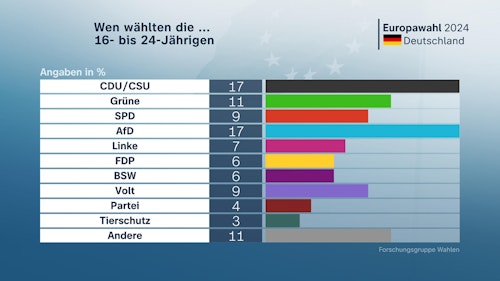
'No pro-European majority in Parliament is possible without us' - Hayer
In a statement on X, the president of the Renew Europe group in the European Parliament, Valérie Hayer, claimed her faction still has a critical role to play despite suffering the biggest losses of the night, dropping around 22 seats in the European Parliament.
"Yesterday’s results show that no pro-European majority in Parliament is possible without us. All our family’s green shoots across Europe show that a strong, democrat Union is what people expect of us," Hayer said.
"We will not let Europeans down. In any country, whatever the result."
Hayer went on to say: "We (...) proudly intend to be in the driving seat of the next pro-European coalition for the upcoming five years. Our Group’s central role will come with a responsibility to make sure our conditions and ambitions are matched."
"The five years to come will be paramount for the prosperity, security and sovereignty of our beloved Europe and its 450 billion inhabitants. From day one, Renew Europe will act in this direction every single day for the many to come."
The group is due to convene later on Monday to discuss its post-election membership. Hayer has already indicated that the Dutch People's Party for Freedom and Democracy (VVD) will be expelled as early as Monday for agreeing to enter government with Geert Wilders' far-right Party for Freedom (PVV) in the Netherlands. It could mean a further loss of four seats.
A huge thank you to all citizens across Europe who used their voice these past four days to shape a better, more efficient Europe. Our @RenewEurope family will be at the forefront of these ambitions. We are ready to be in the driving seat of the next pro-European coalition.…
— Valérie Hayer (@ValerieHayer) June 10, 2024
Hungarian protest party fails to reach Brussels, but takes Orbán's neighbourhood in Budapest
Let’s start the day on, if not a light-hearted, then perhaps an ironic note.
As we reported yesterday, the EU election in Hungary didn’t go entirely to plan for Prime Minister Viktor Orbán’s and his ruling Fidesz party, with the start-up or upstart opposition party Tisza taking almost a third of the national vote.
The Hungarian Two-tailed Dog Party, which started out as a joke in 2006, appears to have failed to win a hoped-for seat or two in Brussels, but its vice-president has pulled off something of a coup in Budapest.
In parallel local government elections, Gergely Kovács has been elected mayor of District XII, a leafy suburb on the Buda side of the Danube, whose hills are dotted with the gated villas of many of Hungary’s political and business elite – including that of Orbán himself.
The great group reshuffle?
The votes have been (nearly all) counted, and the 720 seats in the hemicycle will soon be allocated but several burning questions remain, including which groups parties will choose to join and consequently, what their composition will mean for coalition-building going forward.
Here are the dates for the constitutive meetings to mark down in your calendar:
- 18 June: EPP
- 19 June: Greens/EFA
- 25 June: S&D
- 25 June: The Left
- 26 June: Renew
- 26 June: ECR
- 3 July: ID
Reminder, to become a political group and gain more influence and €€€, these formations need to have at least 23 MEPs from seven different member states.
Will Renew expel VVD?
The liberal Renew Europe group, which lost 20 seats compared to 2019, could on Monday see its tally of 80 seats shrink even further as it votes to expel the Dutch VVD.
The vote was announced nearly three weeks ago by Renew Europe President Valérie Hayer after the Dutch centrist party struck a four-way coalition agreement with the far-right PVV party of Geert Wilders, the centre-right New Social Contract (NSC), and the populist Farmer-Citizen Movement (BBB).
The VVD, which had been helmed by outgoing Prime Minister Mark Rutte for nearly two decades, came third in the European elections, securing 11.6% of the vote, according to preliminary results. That translates into four seats - down one from the current mandate.
Good morning from the newsroom in Brussels
After four days of voting and a hectic night of initial results, the vote-counting continues. This is reporter Robert Hodgson of the Euronews EU policy team, keeping you up-to-date as the dust settles, the mist clears, and the horse trading begins in earnest.